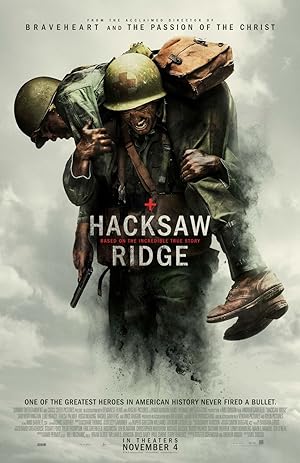Hacksaw Ridge is a historical biographical film about Desmond T. Doss, a conscientious objector who served in the Pacific theater of WWII without killing anyone and saved numerous people on both sides of the conflict. Hacksaw Ridge stars Andrew Garfield and features strong supporting acting performances by Hugo Weaving as Doss’ father/WWI vet and Ori Pfeffer in a minor role as fellow medic Irv Schechter. Mel “raped by a pack of niggers” Gibson directed Hacksaw Ridge. Apparently Hollywood thought the film was so good that it erases anti-Semitism, and Gibson is invited back to all the parties, but is it?
With an editor as ruthless as Gibson’s vision of battle, Hacksaw Ridge could have been that great. Hacksaw Ridge is a solid movie, but Gibson is torn between making a classic WWII movie complete with romance, the war buddies, the cheesy vindication of a trial and using a textured postmodern psychological perspective to inform the viewer of Doss’ motives. Gibson wants the cross to be the American war flag as a symbol of America’s future victory.
Instead Hacksaw Ridge should have been divided into three parts: the wild and abusive childhood, the persecution inflicted upon and excellence displayed by Doss during basic training and after a dollop of brutal and gruesome battle, Doss’ titanic solo rescue operation from the point when he utters his desperate prayer then hears the first cry for help. In this pared down version, Gibson should depict a real life scene where Doss refused to be whisked away after being injured so he can treat more people. Gibson evokes John Irving’s A Prayer for Owen Meaney with Doss’ failed attempt at a bowline during basic training, which later plays a pivotal role in his multiple rescues. Hacksaw Ridge has what it needed, but wanted to do too much and loses focuses on what is exciting about Doss’ story: what does it look like to be like Jesus during war. By the end of Hacksaw Ridge, it is clear that devotion, not pride, was at work in Doss’ actions. Gibson probably cannot make the same claim about Hacksaw Ridge.
Hacksaw Ridge is Gibson’s take on CBS Sunday night Hallmark movie or a Christian film production. He can’t help but be who he is and revel in violence even when he is trying not to, which is one of the reasons that viewers, including me, used to love him. Instead of trying to dilute his brutality with hack humor and Doss’ love of mother, sweetheart, friends and enemies, Hacksaw Ridge should have created a bleaker landscape that only depicted the endless brutality of Doss’ life at the hands of his brother, his father, the men in his company and the enemy so we could appreciate Doss’ character more. I can’t wait to see The Conscientious Objector, a documentary about Doss’ life, for a less tropey account of Doss’ wartime heroics.
Stay In The Know
Join my mailing list to get updates about recent reviews, upcoming speaking engagements, and film news.




